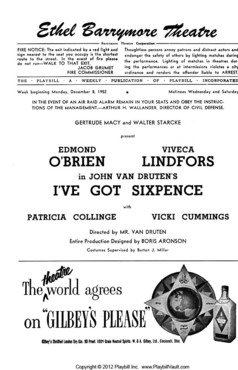| I've Got Sixpence | |
|---|---|
 | |
| Written by | John Van Druten |
| Date premiered | November 1952 |
| Place premiered | Walnut Street Theatre, Philadelphia |
| Original language | English |
| Genre | Drama |
I've Got Sixpence is a 1952 play by the British writer John Van Druten. The plot follows two girls who are roommates and their contrasting relationships with men.
After premiering at Philadelphia's Walnut Street Theatre, it ran on Broadway at the Barrymore Theatre for 23 performances from 2 December to 20 December 1952. The cast included Viveca Lindfors, Edmond O'Brien and Patricia Collinge. [1]
It was not well-received by critics, who felt that O'Brien was miscast. He returned to Los Angeles and resumed his film acting career. [2]